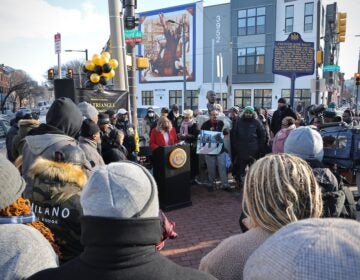Will restoration come in time for Camden’s MLK house?
-
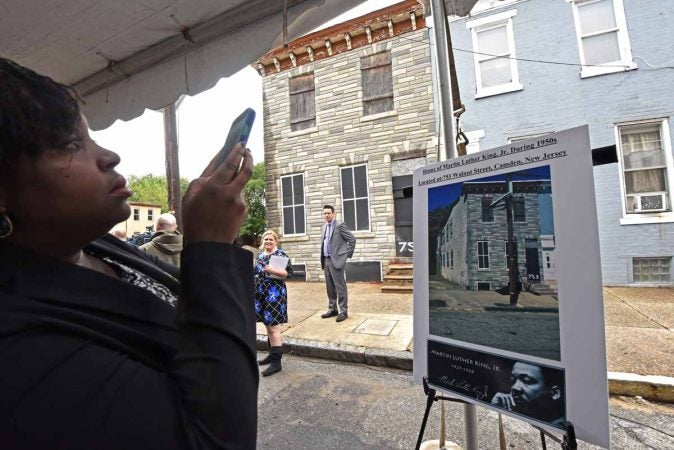
At the September 2016 press conference to announce the preservation of the house at 753 Walnut Street where Martin Luther King, Jr. stayed, a woman photographs a poster; the house is in the background. (April Saul/for WHYY)
-

U.S. Rep. John Lewis and Jeanette Lily Hunt, who owns the house at 753 Walnut Street in Camden where Martin Luther King, Jr. stayed as a seminary student, meet at the September 2016 event to announce preservation of the property. (April Saul for WHYY)
-
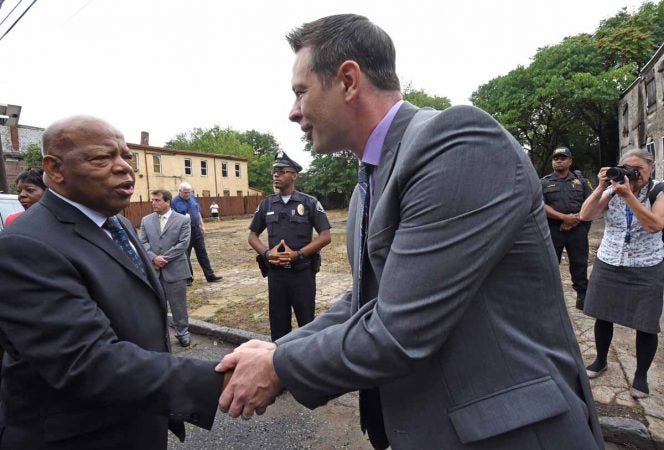
Activist Patrick Duff shakes hands with Rep. John Lewis at the September 2016 press conference in front of the Walnut Street home where Martin Luther King, Jr. spent time as a seminary student. (April Saul/for WHYY)
-

U.S. Rep. Donald Norcross, left; and U.S. Rep. John Lewis address the crowd at the September 2016 press conference to announce the preservation of the Martin Luther King, Jr. house at 753 Walnut Street in Camden. (April Saul/for WHYY)
-
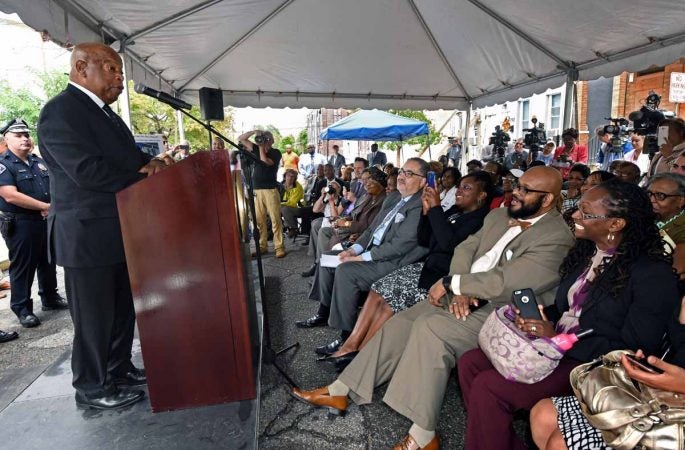
U.S. Rep. John Lewis addresses the crowd at the September 2016 press conference to announce the preservation of the Martin Luther King, Jr. house at 753 Walnut Street in Camden. (April Saul/for WHYY)
-

Attendees listen to speakers at the September 2016 press conference to announce the preservation of the Martin Luther King, Jr. house at 753 Walnut Street in Camden. (April Saul/for WHYY)
-

Activist Patrick Duff addresses the crowd at the September 2016 press conference in front of the Walnut Street home where Martin Luther King, Jr. spent time as a seminary student; seated are, from left to right: Rep. Donald Norcross; Rep. John Lewis; and Camden Mayor Dana Redd. (April Saul/for WHYY)
-
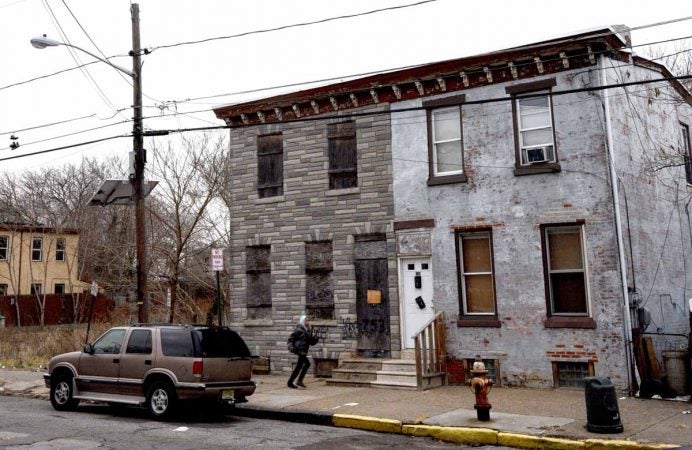
At left; the rowhouse with boarded-up windows at 753 Walnut Street where Martin Luther King, Jr. spent time as a seminary student. (April Saul/for WHYY)
-
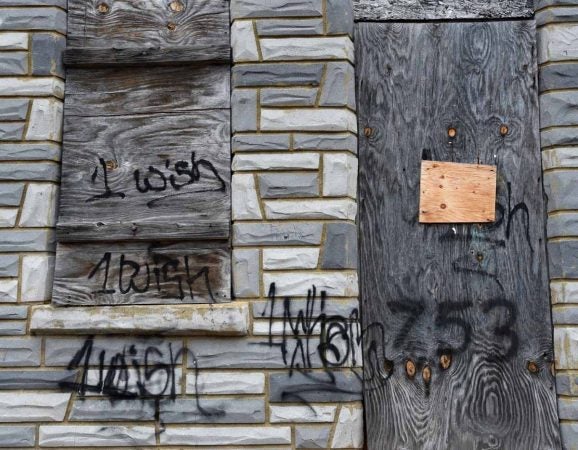
Graffiti on the front of the house at 753 Walnut Street in Camden where Martin Luther King, Jr. stayed as a seminary student before it was removed for a September 2016 press conference. (April Saul/for WHYY)
-

A room inside the rowhouse at 753 Walnut Street where Martin Luther King, Jr. spent time as a seminary student. (April Saul/for WHYY)
-

Civil rights activist Patrick Duff looks at the back bedroom where Martin Luther King Jr. stayed while he was a seminary student. (Emma Lee/WHYY)
-
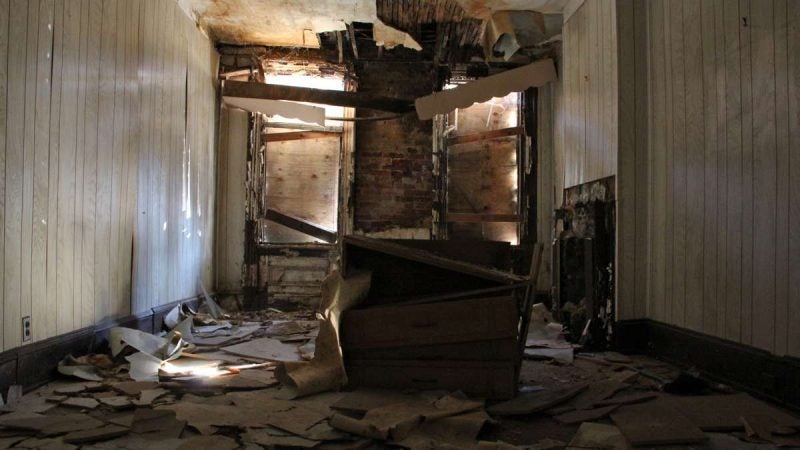
Shafts of light penetrate the boarded windows in the living room of 753 Walnut St. (Emma Lee/WHYY)
-

Bathtub in the home Martin Luther King Jr. visited while he was a seminary student. (Alan Tu/WHYY)
If Martin Luther King Jr. were to spend the night now in the second floor Camden bedroom where he reportedly stayed as a seminary student, he might get rained on.
The house at 753 Walnut Street has a split in the roof and activist Patrick Duff, who has led the fight to preserve the crumbling rowhome, is afraid that by the time the promises to save it are kept, it will have all but collapsed.
In September 2016, Duff—a realtor and Haddon Heights resident who seemed an unlikely savior for the property—was on top of the world.
He’d just joined civil rights icon U.S. Rep. John Lewis, Camden Mayor Dana Redd, and U.S. Rep. Donald Norcross at a press conference in front of the house to celebrate their commitment to saving it, each expressing their dedication to the project as TV cameras rolled.
The boards covering the windows of the old house had been painted, the graffiti was gone, and the desolate block had been spruced up for the occasion.
Tents shielded 100 guests from a gray drizzle. Longtime King associate Lewis called the house a “piece of historic real estate that must be saved for generations yet unborn.” Norcross said, “ I’m proud that I was able to bring our community together to help restore and save this important piece of American history.”
Thirteen months later, Duff wonders whether the intention was to save the ramshackle house or create a great photo op for politicians. It was King who once said we need leaders “not in love with publicity but in love with humanity.”
On October 14, 2016, Duff, then-president of the Camden County NAACP Colandus “Kelly” Francis–who had worked with him to preserve the rowhome–and the home’s owner, Jeanette Lily Hunt, attended a meeting at Cooper’s Ferry Partnership after the Camden nonprofit had offered to take custodianship of the project.
At the meeting, said Duff, Cooper’s Ferry and city officials promised to request historic status from Camden city. Novella Hinson, Mayor Redd’s chief of staff, said city historic designation would pave the way for funding that could be used to stabilize the roof immediately–while in the meantime, state designation would also be sought. After Meishka Mitchell of CFP explained it would be easier to apply for grants if Cooper’s Ferry took ownership of the home during the restoration process, Hunt agreed to sell the house to the nonprofit for a dollar.
Less than two weeks later, Norcross announced that the Camden Historic Preservation Commission had given the home historic status.
Then, Cooper’s Ferry sent Duff a contract stipulating that Hunt sell CFP the building for a dollar, with a closing date of January 27, 2017. Both Cooper’s Ferry and Hunt signed it, but the closing never happened.
This left Hunt — a teenager when King stayed at her family’s home in the early 50s — on the hook for an annual $509 in real estate taxes, and technically responsible for repairs and liability.
Cooper’s Ferry didn’t explain to Duff why they backed out of the closing. He is frustrated that officials insist the current delay is driven by a wait for historic status from the state because that requirement was never mentioned at the meeting.
On January 9 of this year, Cooper’s Ferry Partnership CEO Anthony Perno had told the NY Times: “CFP will preserve the history of the home at 753 Walnut Street in order to provide future generations with the opportunity to learn more about Martin Luther King Jr.1s stay in the City of Camden.”
No one at Cooper’s Ferry would comment for this story, though representatives for the city of Camden and Norcross expressed their continued support for the project.
Duff took on the cause of saving the house three years ago, when he learned that King and three friends were denied service at a Mary’s Café in Maple Shade by a gun-waving owner. King, a 21-year old Crozer Theological Seminary student at the time, pressed charges and was said to have been inspired by the 1950 incident. Mary’s had been demolished, but Duff found King’s Walnut Street address, where he stayed with a fellow seminary student, in a police report. Duff asked Norcross and other politicians to help preserve the structure at a March 2016 town hall meeting.
Duff is offended that after he spent months exhaustively researching every local King connection, the N.J. Department of Environmental Protection has given two Stockton State University professors $21,000 to investigate King’s history with the house; still, he plans to introduce the pair to King associates he has met in Camden.
“The fact that I’m a salesperson, not college-educated, not a professor,” said Duff, “is why they hired a team to do the research I actually did…to spend thousands of dollars when you knew you needed to stabilize the roof first?”
Spokesman for N.J. DEP Larry Hajna admits that while it’s unusual to order a study in this situation, “We have tidbits that were tantalizing but we really needed more concrete information.”
Recently, Duff’s bewilderment turned to fury when he discovered that Cooper’s Ferry never told him or Hunt that CFP had been allocated a federal Community Development Block Grant of about $229,035. That funding is awaiting HUD and Camden City Council approval, according to an official in the city’s Bureau of Grants Management.
“CFP changed their story, breached a contract with the home owner, and said they couldn’t help anymore unless post-agreement conditions were met,” said Duff. “At the same time CFP was applying for grants, they were telling me they couldn’t move forward with the project, so where’s the money?”
Last week, said Duff, he called Camden city ombudsman Vincent Basara to ask for a tarp to protect the home’s roof and was told approval for that would take time.
Moorestown architect Jefferson Moon, who has volunteered his time to help with the project, says even a temporary fix is critical. “When the roof gives up,” he said, “you could lose the whole house.”
Though it is not unheard-of for a nonprofit like Cooper’s Ferry to apply for funding for a building it does not technically own, Francis, the former county NAACP leader, attribute’s CFP’s actions to politics as usual. “That’s just how they operate…the more money they get, the more contracts they can give to their friends and contributors.
“None of them give a damn about the Martin Luther King house. It’s not their history, so they don’t care.”
If the house is preserved, it will be luckier than some of the most cherished, iconic buildings in Camden. The looming demolition of the hundred-year old Camden High castle edifice seems almost merciful compared to the agonizing, decades-long demise of the Carnegie Library on Broadway, with a tree poking through its roof and an ironic sign in front proclaiming its preservation.
Historian Clayborne Carson, who directs the Martin Luther King, Jr. Research and Education Institute, is painfully aware of the difficulties involved in saving noteworthy civil rights sites. While Medgar Evers’ Mississippi house was designated as a National Historic Landmark this year, Carson says the Gaston Hotel in Birmingham, AL that was bombed in an attempt to kill King has gotten no attention.
That the leaders of a poor city trying to reinvent itself are so focused on redevelopment that they might fail to grasp the hope, beauty and even marketability of its proud history is not surprising.
But it is woefully short-sighted.
WHYY is your source for fact-based, in-depth journalism and information. As a nonprofit organization, we rely on financial support from readers like you. Please give today.



